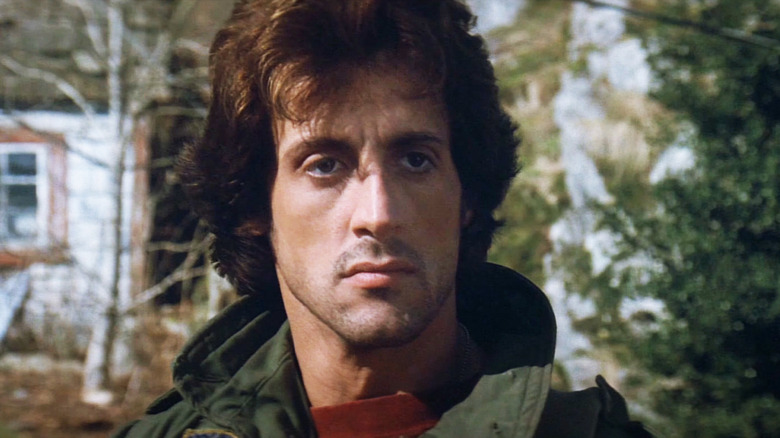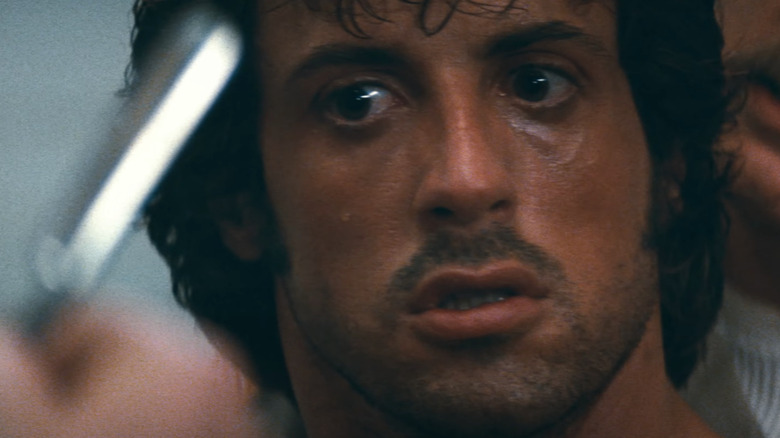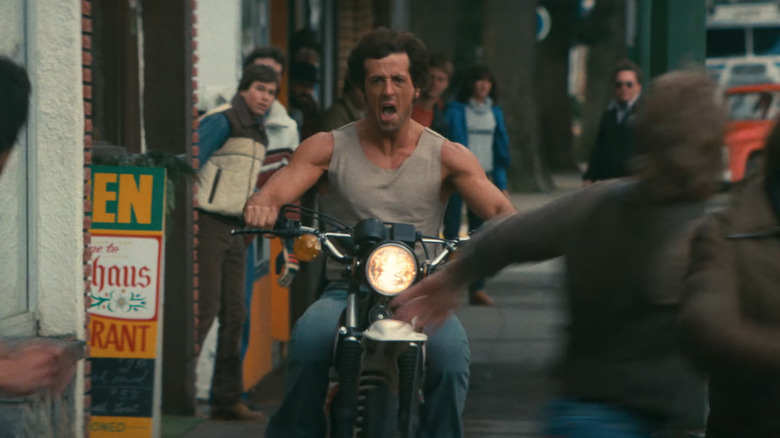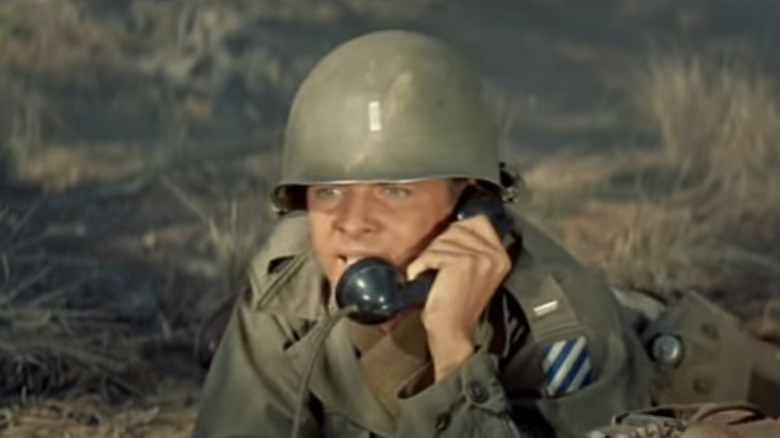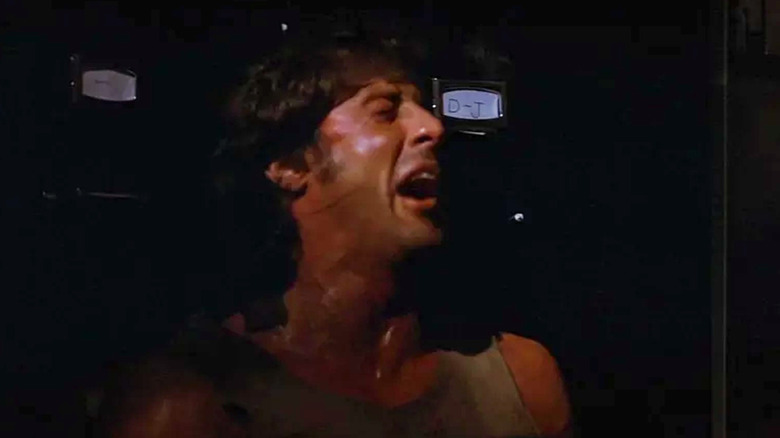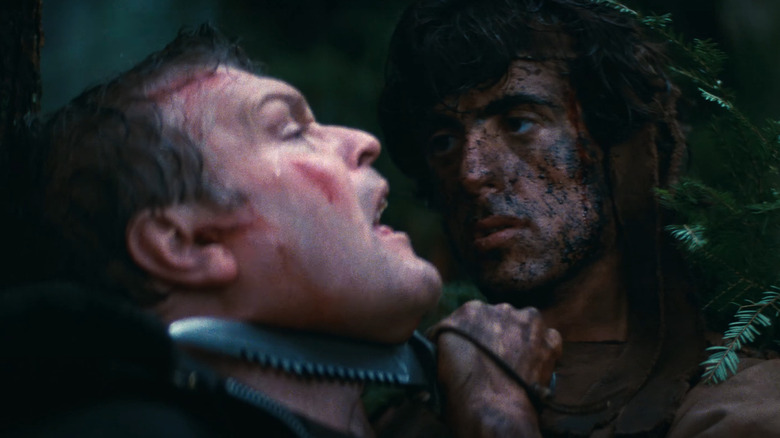Rambo: First Blood Was Born From Two Harrowing True Stories About War Veterans
We may receive a commission on purchases made from links.
There's a confusing narrative surrounding 1982's "First Blood." Amid the mayhem of its bloody blockbuster sequels, the film either gets misremembered as a straightforward action flick, or is claimed to be a deep exploration of the psychological effects of war on returning soldiers. But the adaptation of David Morrell's 1972 novel is both.
As his franchise took off, Sylvester Stallone's John Rambo would evolve (or devolve?) into a more stereotypical action hero, cutting down entire armies with belt-fed machine guns over the course of four sequels. Stallone even thinks "Rambo 4" is his best action film. But in "First Blood" the character is more multi-faceted. A Vietnam vet who finds himself at odds with the society he believed he was fighting for, John Rambo doesn't directly kill anyone once he runs afoul of a hard-hearted small-town Sheriff and his deputies. Instead, he flees into the Washington State wilderness (which was actually the Canadian wilderness, leading to multiple filming delays) and defends himself against successive attempts to draw him out and/or kill him.
And between the moments of tactical guerilla action that ensue, there's a significant attempt to retain much of the book's social critique and depiction of the Vietnam War's lingering effects on soldiers. It all coalesces into a wholly different film from any other entry in the "Rambo" franchise — one which combines the bombast and machismo of a one-dimensional action blockbuster with a reflective and critical tone. And while you might think that incongruous mix is a by-product of the clash between Hollywood sensibilities and the film's literary beginnings, it was actually all waiting there in the pages of Morrell's "First Blood."
Two-tone action
In "First Blood," once Rambo flees into the woodland, his former commanding officer, Colonel Samuel R. Trautman (Richard Crenna) arrives, seemingly as an excuse to deliver the kind of superlative-laden lines you'd expect from your typical 80s action outing. At one point he tells Sheriff William Teasle (Brian Dennehy): "I didn't come here to rescue Rambo from you, I came here to rescue you from him." There's plenty of that kind of over-the-top "this guy's the best of the best" language throughout, foreshadowing the direction the "Rambo" series would take from 1985's "Rambo: First Blood Part II" on.
And according to Sylvester Stallone, there was a lot more of it in the original script, including a section that had Rambo shooting an owl and saying "take that you mouse-munching motherf*****." Before he cut that, along with most of his dialogue, Stallone seriously thought "First Blood" would ruin his career.
But beneath the dangerous stunts, cliché action tropes, and hammy dialogue, the film made a concerted effort to keep the social critique of the book. "First Blood" starts with Rambo learning that his former friend and fellow soldier, Delmar, passed away from cancer caused by exposure to Agent Orange while serving in Indochina. Once he's arrested by Sheriff Teasle and assaulted by his deputies — a metaphor for the United States' treatment of returning soldiers — the Vietnam vet has flashbacks to being tortured as a prisoner of war. And at the end of "First Blood," he breaks down before launching into an extended monologue on how his Vietnam experience affected his psyche and his ability to function in civilian life. And this blend of Hollywood action tropes with social critique and character study was something author David Morrell intended.
The soldier on Route 66
When Stallone signed on to "First Blood" he did so on the proviso that he could rewrite the script. His changes were designed to make John Rambo a more sympathetic character, including making sure he doesn't actually kill anyone. Both the original script by William Sackheim and Michael Kozoll, and David Morrell's novel had Rambo offing numerous attackers. But Sly wanted to bring some of his good-hearted Rocky charm to the role, and the direct killing of policemen, state troopers, and the national guard was removed.
Back when he was writing "First Blood," the last thing on Morrell's mind was whether his Vietnam vet would have any of the Italian Stallion's everyman appeal. Growing up, the author was inspired by TV series, "Route 66," a 1960s anthology drama starring Martin Milner and George Maharis as two young men who drove the titular highway across the US in search of adventure. As Morrell recalled in his book "Rambo and Me: The Story Behind the Story", the only time he'd heard about the Vietnam War growing up was in an episode of the show entitled "Fifty Miles from Home," which featured a returning soldier who, "had trouble shutting down his war mentality." In this guest star's brief appearance, though he didn't know it at the time, Morrell would find the seed of an idea for his own Vietnam vet character.
And it wasn't just the soldier who struggled to re-assimilate that inspired Morrell. "Route 66" with its "blend of intense action and powerful themes" propelled the young Canadian to pursue a career in writing. That would ultimately lead him to pen the similarly action-packed yet thematically complex "First Blood," inspired by Stirling Silliphant's scripts for the anthology show that had meant so much to him growing up.
The most decorated soldier of WWII
Having been inspired by Stirling Silliphant's writing, David Morrell — whose horror novel "Creepers" is soon to be adapted for the screen — studied English at St. Jerome's College in southern Ontario before setting off on his own "Route 66"-esque odyssey to the United States for grad school. There, he studied at Penn State and taught composition classes, one of which included several veterans as students. In his book, Morrell recalled:
"I learned how they had nightmares and broke out in spontaneous sweats and dove behind cover whenever they heard loud noises. I learned about their anger, their frustration, and their fears. These days, we have a term for what they were enduring—post-traumatic stress disorder. But back then, the only description that I could think of dated back to World War One: shell shock."
A major reference point for Morrell was World War II vet Audie Murphy, who the author knew as an actor in westerns he'd seen growing up. The 1955 war movie "To Hell and Back," based on Murphy's autobiography, showed how Murphy had become America's most decorated soldier of World War II. He'd received the Medal of Honor for facing down six tanks, calling artillery fire from his command post and killing scores of advancing troops, before climbing atop a burning tank and using its .50 caliber machine gun to continue the barrage. Alone and, according to the official report on the event, "exposed to German fire from three sides," Murphy killed dozens of German troops, suppressing the enemy advance.
Unsurprisingly, Murphy had serious psychological issues after he returned from war. Plagued by insomnia and nightmares, he became depressed, and slept with a gun under his pillow, which he'd often wake up and discharge in the middle of the night.
First Blood
In Audie Murphy, star of some of the great war movies, David Morrell found yet more inspiration for his Rambo character. Surrounded by anti-war protests in his adopted country of the United States, the author would find himself watching coverage of the 1968 Democratic national convention in Chicago, where protestors clashed with 12,000 police officers. The resulting riot got Morrell thinking:
"What if one of those protestors was like those angry veterans I'd encountered in the classes I taught? What if one of those veterans was a man with exceptional combat skills, a former member of a Special Forces team, an escaped POW, and a recipient of the Medal of Honor? Or what if he were Audie Murphy?"
After being struck by that very idea, "First Blood" began to percolate in Morrell's mind. Everything he'd absorbed since his days spent watching "Route 66," through to his direct experiences with war vets, anti-war protests that descended into violence, and his appreciation for Audie Murphy's singular heroism finally coalesced. He began writing "First Blood" in 1968, and by 1972, the book was on shelves, comprising a couple decades worth of observations and experiences. Before he became '80s action hero John Rambo in the Stallone film, he was just Rambo — a combination of the "Fifty Miles from Home" soldier, the most decorated soldier from World War II, and all the tumult of the 1960s and its anti-war demonstrations.
Rambo on the big screen
When Sly Stallone signed on to star, the film version of "First Blood" had been in development for some time, bouncing between studios before the William Sackheim and Michael Kozoll script emerged. And once Stallone made his edits, Rambo was finally ready for his big-screen debut.
10 years after Morrell's novel had launched, the film brought much of the author's concerns about returning veterans and the debilitating psychological effects of war to a wide audience. "First Blood" made $125 million at the box office on a $14 million budget, making it a bona fide hit — leading to embarrassing side effects for Sylvester Stallone.
No doubt much of the success was down to Stallone's character, who despite being a haunted vet was also an undeniable badass. But far from that being an invention of the Hollywood machine, it was all there in the story of Audie Murphy, his stalwart determination in battle, and his heroic facing down of German troops. That, in turn, was waiting in the pages of "First Blood," alongside all the harrowing tales of haunted war veterans that had inspired John Rambo's tortured psyche.
Once it came time for a sequel in 1985, bewilderingly titled "Rambo: First Blood Part II," there would be no more of Morrell's words on which to base the story. And so, much like the solder from "Fifty Miles from Home," John Rambo would set off on his own pilgrimage, only this journey would be towards becoming a Hollywood action hero, adept at single-handedly laying waste to entire armies. The sequels are fun in their own right. But "First Blood" was different for embodying that same, "blend of intense action and powerful themes" from "Route 66" that had inspired Morrell at the start of his own journey.
